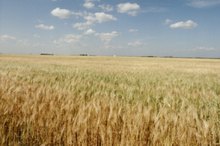Is Quinoa a Complete Protein Food?
Quinoa is considered a whole grain. It is the seed of a leafy plant related to spinach. Although most plant-based foods do not contain complete proteins containing all of the essential amino acids, quinoa is a complete protein. This makes quinoa a particularly beneficial food for those who do not eat animal products.
Protein in Quinoa
Most whole grains do not contain the amino acid lysine, or contain very little lysine. Quinoa, however, supplies this amino acid along with the other eight essential amino acids in amounts that are balanced well for the needs of humans. Quinoa also has a relatively high amount of protein for a grain at 13.8 percent protein. One cup of cooked quinoa contains 8 g of protein, while the same amount of barley contains only 3.5 g of protein and brown rice contains only 5 g of protein.
Other Nutrients
Fiber In Quinoa
Learn More
Quinoa also provides you with more copper, fiber, iron, magnesium, manganese, phosphorus, potassium and zinc and less sodium than corn, wheat or barley. Quinoa is also low in gluten, so even those with celiac disease can enjoy it.
Considerations
Rinse quinoa before you cook it. This removes the bitter coating, called saponin, that is on these seeds. Eat quinoa in moderation, as one cup provides 220 calories and 3.5 g of fat along with its high-quality protein. Should you have some difficulty finding this grain in your grocery store, most health food stores sell both the whole grain and the flour.
Use
Can You Eat Raw Quinoa Grain?
Learn More
Quinoa is very versatile. You can use it like rice in savory dishes, make it into breakfast porridge or grind it into a flour to use when baking. You can also ferment it to make a type of beer. To cook the whole grain, use one part quinoa and two parts liquid, bring to a boil and cook covered in a pot until the liquid is absorbed, approximately 15 minutes. One cup of dry quinoa yields approximately 3 cups cooked.
Related Articles
References
Writer Bio
Based in Massachusetts, Jessica Bruso has been writing since 2008. She holds a master of science degree in food policy and applied nutrition and a bachelor of arts degree in international relations, both from Tufts University.









